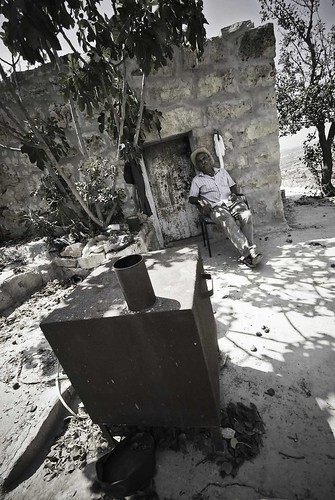
Abu Akrum lives in Bethlehem's Deheisha refugee camp. His family was displaced from their village near the "green line" as a result of Israeli violence during the 1948 Arab-Israeli war.
Of all the people I have met in Palestine Abu Akrum is one of the most inspiring. He turned an area of cactus overrun land, within the refugee camp, into a thriving jungle of a garden that provides many of his family's vegetable needs.
10 years ago Abu Akrum bought a 23,000 square metre area of farm land in an area of bethlehem district called Al Khader. He now makes a small living as a farmer of fruit, vegetables, and honey. This living is, however, far from easy. The land that Abu Akrum farms is now on the wrong side of Israel's separation wall, and upon the wall's completion there is no guaruntee that Abu Akrum will be able to use this land as he does now. The dirt track that connects Abu Akrum's land to the main Jerusalem-Hebron road is in a state of such disrepair that to farm this vast area of farmland in a way that is economically viable is next to impossible.
Recently Abu Akrum's farmland summer house was broken into and set alight, ruining over 1km of irrigation piping as well as tools. With a small Israeli outpost settlement just over the hill above his land, Abu Akrum suspects the settlers. There are many other reports of abuse of Palestinian farmers by Israeli settlers in this particular area, including claims of farmers being shot at.
In the background of the above picture is the Israeli settlement of Betar illit, another colony illegal under international law but now considered by israel as part of the defacto state. Betar illit is on the hill tops above the village of Wadi Fukin, another formerly highly productive area within the west bank. Now, however, due to israel's economic constriction of palestinian farmers Wadi Fukin is slowly becoming a village operating at little more than self-sufficiency.



No comments:
Post a Comment